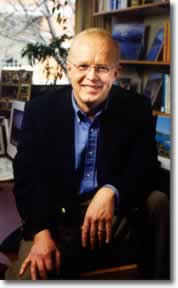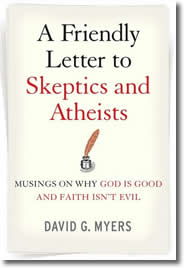A Friendly Letter to Skeptics and Atheists
Author and social psychologist David G. Myers talks about his new book and his firm belief that faith and science can co-exist
Read an excerpt from the bookWhy a “friendly” letter to skeptics and atheists?

Because I am a friend of skeptics, and to a great extent a skeptic myself—someone who loves to see testable claims put to the test. My introductory psychology text offers critical examinations of ESP, near-death experiences, subliminal persuasion, astrology, alleged repressed and recovered memories, and much more. Ergo, I’m a person of faith who aims to bridge the skeptic/believer divide and to support others who are near that boundary.
What in particular about the new atheists' claims spurred you to write this book?
Reading Sam Harris, Richard Dawkins, and Christopher Hitchens I encountered the pervasive claim that religion—all religions—are dangerous (as well as false). Belief in God, they argue, is toxic, even the root of all evil, and we’d be vastly better off without it. Well, I thought, religion does have its horror stories. But the available data refute the thesis that religion is predictably harmful. And thus was born this little book, which supports a Christian faith that is, methinks, reasonable, science-affirming, healthy, hopeful, and humane.
You are a psychologist who has studied and written much about science. Does your Christianity ever get in the way of your scientific perspective?
As I explain in the book, there is some tension between some common understandings of Christian faith and what we’ve come to learn about mind and body, about illusory thinking, and about sexual orientation. But on reflection, I see faith and psychological science as congenial even in these domains.
In a deeper sense, my faith doesn’t just permit science, it mandates it, as it did for the early scientific pioneers. Recognizing that there is a God (but it’s not you or me) mandates humility before nature. Scientific inquiry is part of our response to the great commandment to love God not just with our hearts but with our minds. And I believe God’s revelation is in nature as well as in scripture. As Jesus reminded us, we have much to learn: "I still have many things to say to you, but you cannot bear them now. When the Spirit of truth comes, he will guide you into all the truth." That’s a truth that sets us free to allow our minds to be expanded by God’s continuing revelation.
Your book compares the health, happiness, civility, morality and generosity of those people who are actively involved in practicing their faith with those who are not involved in a faith community. Why did you take this approach?
Given that we have massive amounts of pertinent evidence, why settle for a contest of dueling anecdotes—of the faith-related Crusades versus atheist-related Stalinist and Maoist genocides, or of the Bible-banging homophobic “Rev.” Fred Phelps and Ku Klux Klanners versus the faith-related civil rights and anti-apartheid movements? Why not ask some simple questions: Compared to not-religious people, are the devout more or less generous? likely to volunteer? to divorce? to commit crime? to be happy? to be healthy? (Actually, the questions aren’t quite so simple, because we need to control for some other factors, but that can be done.)
What does this evidence—that an active faith life proves beneficial to our health and happiness—say to you about the existence and character of God?
About God’s existence, which cannot be proven, it says nothing. If faith, on balance, contributes to human flourishing, that’s worth knowing. It’s a partial answer to the new atheists. But it still leaves truth up for grabs. And truth is what ultimately matters, yes? If religious claims were shown to be untrue, though comforting and adaptive, what honest person would choose to believe? And if religious claims were shown to be true, though discomfiting, what honest person would choose to disbelieve?
 Your chapter on prayer might surprise some Christians. In
fact you were relieved when the experiments on intercessory prayer showed no
difference in the health of those who were prayed for and those who weren’t.
Aren’t these the kinds of results that atheists can use to prove that God
doesn’t exist?
Your chapter on prayer might surprise some Christians. In
fact you were relieved when the experiments on intercessory prayer showed no
difference in the health of those who were prayed for and those who weren’t.
Aren’t these the kinds of results that atheists can use to prove that God
doesn’t exist?
Yes, atheists will like the recent prayer experiment results, which consistently find no effect of distant intercessory prayer on healing. Zilch. But speaking as a person who begins each day in prayer, that’s also the result I predicted, in print, in advance. Before having my null effect-prediction and rationale dated and notarized, I shared my statement with a number of theologian and chaplain friends, some quite conservative. They all concurred in expecting this testing of God, with its rather magical ideas about prayer, to yield a null effect. And as Henri Nouwen reminded us, clearing the decks of some of popular religion’s false gods can help prepare our hearts for the bigger God of the Bible.
How do you respond to the claim that God is a construct invented to meet our psychological needs?
That claim strikes me as the mirror image of the “do the benefits of faith prove God?” question. If religious belief and community are an evolutionary adaptation, or if belief in God satisfies our needs for meaning and control, that says nothing about its truth (though I would probably take more comfort in faith serving a purpose than its serving no purpose).
The point to remember is that explaining a belief does not explain it away. This is equally true for efforts to explain atheism, as in the long-ago book, The Psychology of Unbelief. Might atheism be adaptive, because it reduces restraints on sexual activity and nullifies religion’s teachings regarding the claims of the poor on our material resources? Would a complete explanation of atheism’s psychological function destroy it as a credible alternative?
Not at all. If both theism and atheism become fully explained, as would happen if psychological science completes its work, that cannot mean they both are false. The truth or falsity of any claim (is the earth warming? does she love me?) is a separate question from why one believes the answer is yes or no.
In the end, you advocate a healthy skepticism on both sides of the fence. What makes a flexible stance like skepticism healthy?
A faith-motivated skepticism—a willingness to ask “what do you mean?” and “how do you know it?”—can, when applied to the right questions, stretch our minds and lead us to deeper understandings of the creation and of ourselves. It’s also healthy because a non-defensive spirit of humility is conducive to the free marketplace of ideas, which is rooted in the recognition that neither you nor I have a corner on truth. So let’s explore, and then share and debate our conclusions in the confidence that from this process greater wisdom will emerge. That, I hope, is the spirit underlying my Friendly Letter. I think it’s also part of how we, today, worship God with our minds.
And where for you, as a Christian and scientist, are the absolutes?
Although I’ll admit to not spending much time thinking about my “absolutes,” I would say that my life flows from Christian assumptions (even while keenly aware that many things are incomprehensible to my wee brain). I assume that God is, and that God-in-Jesus embodied and modeled ultimate love, and gives us hope.
Rather than embracing my culture’s individualism—meaning let’s each make up our own beliefs and values—I embrace a faith tradition that crosses the centuries, helps make sense of the universe, gives meaning to life, opens me to the transcendent, connects me in a supportive community, provides a mandate for morality and selflessness, and offers hope in the face of adversity and death. I seek to live this faith—it’s the true audacity of hope—even while mindful that we’re all mere humans and surely wrong in some respects.
And
so, I suggest in my concluding sentence, perhaps we can all “draw wisdom from
both skepticism and spirituality, by anchoring our lives in a rationality and
humility that restrains spirituality with critical analysis, and in a
spirituality that nurtures purpose, love, joy, and hope.”
Read an excerpt from the
book
Hope College social psychologist David G. Myers is author of A Friendly Letter to Skeptics and
Atheists: Musings on Why God is
Good and Faith Isn’t Evil, from which more excerpts are available here.